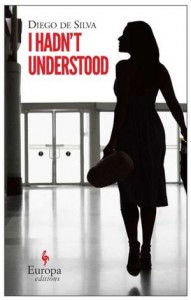“I’m an inconsistent narrator…I’m too interested in incidental considerations that can take you off track. When I tell a story…my thoughts don’t seem to grip the road, they tend to skid and drift…I suffer from morphosyntactic impairment, a dysfunction of the structure of my phrasing.”
 Cocky and self-confident on the surface, Neapolitan attorney Vincenzo Malenconico is a personal failure by most objective standards. His psychologist wife has left him, his sometimes troubled kids have their own lives and don’t want his “help,” and he lives in a lonely apartment. He has few, if any, clients and no private office, sharing office space with numerous other failures. He dithers, constantly imagining different outcomes for situations he has already faced, rewriting conversations which have ended badly for him, and perpetually reviewing his own past history. He makes hilariously ponderous philosophical observations and messes up his life royally. Though he has a new love with whom he shares passionate encounters, she seems far too clever to become involved with him and keeps him constantly worrying about the future. Now, for reasons known only to himself, he has decided to tell his story, but as he ponders what to say, he even imagines himself in the role of one of his own readers who might ask, “Why should we go to the trouble of understanding you? We don’t want to do your work for you. Why don’t you take us for an enjoyable ride someplace.”
Cocky and self-confident on the surface, Neapolitan attorney Vincenzo Malenconico is a personal failure by most objective standards. His psychologist wife has left him, his sometimes troubled kids have their own lives and don’t want his “help,” and he lives in a lonely apartment. He has few, if any, clients and no private office, sharing office space with numerous other failures. He dithers, constantly imagining different outcomes for situations he has already faced, rewriting conversations which have ended badly for him, and perpetually reviewing his own past history. He makes hilariously ponderous philosophical observations and messes up his life royally. Though he has a new love with whom he shares passionate encounters, she seems far too clever to become involved with him and keeps him constantly worrying about the future. Now, for reasons known only to himself, he has decided to tell his story, but as he ponders what to say, he even imagines himself in the role of one of his own readers who might ask, “Why should we go to the trouble of understanding you? We don’t want to do your work for you. Why don’t you take us for an enjoyable ride someplace.”

When over-analytical and unlucky Vincenzo is called upon by the courts to represent a low-level member of the Camorra, a Mafia-style organized crime syndicate which has existed in Naples since the eighteenth century, he tries, in vain, to figure a way out, but with virtually no time left to decline or prepare for court, he finds himself defending Domenico Fantasia, DBA Mimmo o’Burzone, who has been remanded to jail pending official charges. Vincenzo’s natural demeanor suddenly changes when he arrives in court, however, becoming, to his own amazement, very aggressive, and he offers a vigorous defense.
“We found a hand in your client’s back yard,” the assistant district attorney (described as a man with “a Cliff Notes face”) announces.
“So what?” I say…
“What do you mean ‘So what?’ ”
“Well, so what? What do you plan to do, charge him with concealing a hand?”
When the judge unexpectedly releases his client at the end of the hearing, however, he is chilled to hear Fantasia say, “Thanks, Counselor. I’ll call you.” And that’s when the real action begins.
 A genre-bending novel which focuses primarily on Vincenzo’s psyche, it also offers glimpses of both the Italian court system and the workings of the organized Camorra, which Vincenzo, in his wisdom, decides is better than the “nondescript grab-bag of criminals roaming the streets…deeply irresponsible, casually practicing a level of violence that’s absolutely disproportionate in terms of its criminal objectives.” He even comes to believe that the Camorra should “liberate the citizenry from the barbarity of disorganized crime…get back in the trenches, fight the good fight, make it safe to walk the streets again.”
A genre-bending novel which focuses primarily on Vincenzo’s psyche, it also offers glimpses of both the Italian court system and the workings of the organized Camorra, which Vincenzo, in his wisdom, decides is better than the “nondescript grab-bag of criminals roaming the streets…deeply irresponsible, casually practicing a level of violence that’s absolutely disproportionate in terms of its criminal objectives.” He even comes to believe that the Camorra should “liberate the citizenry from the barbarity of disorganized crime…get back in the trenches, fight the good fight, make it safe to walk the streets again.”
Nothing is sacred in this mélange of dramatic activity combined with Vincenzo’s musings about life, from the nature of reality (“Reality mumbles. It expresses itself in incomplete sentences.”) to comments on Gilbert O’Sullivan’s 1972 recording of “Alone Again, Naturally,” a song he analyzes in some detail. He writes of the sad-sack lawyers who languish in the waiting rooms of prisons in the hope of a job, all the while commenting with “false cynicism” on what they see, and the arrogance of the Camorristi. He tries to define love and what it means, and creates numerous pseudo-philosophical treatises, very funny, about life as he (imperfectly) knows it. Slowly, it appears that Vincenzo is starting to get some clues about what life is all about, but as his wife Nives and his children make their moves, Vincenzo is unsure which view of the real world is the one with which he agrees.

Winner of the Naples Prize for Fiction for this novel, author Diego DeSilva is also a writer of plays and screenplays, and his sparkling dialogue and sense of dramatic irony reflect this experience. His main character’s first person story is lively and honest (or as honest as Vincenzo can be), and it involves the reader from the outset since everyone can imagine privately making the same kinds of excuses, exploring the same kinds of too-late alternatives to actions s/he has already taken, and to bringing down bullies and officious functionaries. The end result is a novel which is so literate and so intelligent, albeit it completely different from what anyone would expect, that every page is a treasure trove of observations and conclusions – and it is hilariously funny. Highly recommended for those who enjoy ironic novels that move beyond the ordinary and into the psychology of the characters and their behavior. On my list of Favorites for the year, so far.
ALSO by Diego De Silva: MY MOTHER-IN-LAW DRINKS
Photos, in order: The author’s photo appears on http://www.ilgattonero.it
The metropolitan scene of Naples is from http://www.travel-wonders.com
Naples at night is featured on http://traveltips.usatoday.com
